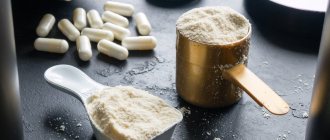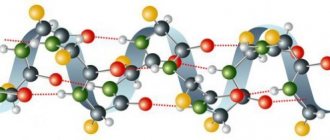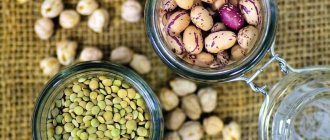© designer491 — stock.adobe.com
Share:
When considering sports nutrition, we focus on macronutrients, protein, carbohydrate cocktails, and the right fats. However, it is important to understand that any protein is broken down into amino acids, and arginine is one of the most important amino acids that provides phenomenal pumping.
General information
So what is arginine? First of all, it is an amino acid that our body receives from protein. Unlike other amino acids, arginine is not independent and can be synthesized by the body from other components.
As is the case with the use of all other sports supplements, excessive abuse of arginine leads to the fact that our body ceases to synthesize its own arginine. For this reason, after unloading and refusing an increased amount of protein rich in the amino acid arginine, dysfunction of some body systems is possible.
At the same time, unlike other proteins, the body’s natural need for arginine is much lower. In fact, we get the same addiction as with creatine. When the need is low, the body practically does not produce this acid on its own. In turn, this leads to the fact that the amount of arginine produced by the athlete is significantly reduced. At the same time, arginine is poorly absorbed from food due to its replaceability - when absorbed, it breaks down into those amino acids from which it is built independently. This is why arginine supplements are so popular.
© nipadahong — stock.adobe.com
Biochemical profile
Arginine is a semi-independent amino acid – meaning it is not required in the diet. However, although our bodies produce it, supplementation is sometimes beneficial for athletes and bodybuilders. Arginine is obtained from foods (whole wheat, nuts, seeds, dairy products, poultry, red meat and fish) or taken as a supplement.
The benefits of L-arginine stem from its role in protein synthesis. It acts as a precursor to nitric oxide, a powerful vasodilator. Arginine is important for cellular function, muscle development, treatment of erectile dysfunction, high blood pressure and congestive heart failure.
What is the daily requirement?
To ensure timely intake of amino acids into the body, you should learn about foods rich in arginine, as well as the daily requirement of the component:
- Adults – up to 6 grams;
- Children under 16 years old – up to 4 grams.
People who are actively involved in sports that allow them to build muscle mass should increase their intake to 9 grams per day. Often this will require additional intake of the component, but it is better to prefer natural over synthetic. The table allows you to find out where arginine is contained, as well as the recommendations of the trainer and the attending physician.
Arginine in general metabolic processes
What is arginine used for outside the world of athletic performance? Let's return to the essence of this connection. This is a basic amino acid that is produced by our body. If it is produced, it means it is needed to satisfy vital needs.
First of all, arginine is a thinning diuretic. In particular, after the arrival of insulin, arginine as a transport protein, flowing through the vessels, cleans out the remaining cholesterol, and most importantly, removes excess sugar along with the secondary urinary fluid. This increases the speed of blood flow and improves the susceptibility of blood bodies to the external manifestation of nitrogen. In fact, arginine acts as a powerful nitrogen donor. This means that it directly affects recovery from any damage, and in addition, it has a pleasant bonus in the form of sexual stimulation, provided that it is consumed in increased quantities.
Arginine is one of the free amino acids from which muscle tissue can be created. This does not mean that it is necessarily found in the muscles, but if necessary, it breaks down into the amino acids necessary for construction. In the first cycles of anabolism, this allows for a short-term increase in the overall endurance and energy efficiency of the body, which is especially important for endomorphs.
Being a regulator of so many processes, it is directly involved in the synthesis of T-lymphocytes, the main cells that protect the body from manifestations of the external environment, creating a favorable background for building immunity.
The same factor can be turned against arginine. People with human immunodeficiency syndrome (AIDS) are strictly prohibited from consuming foods high in arginine. The compound synthesizes new lymphocytes, in which the virus is immediately located, therefore, accelerates its spread through the blood and worsens the residual resistance of the body.
Foods High in Arginine
Without a doubt, the most important food containing large amounts of l-arginine is watermelon. Kai Green has proven this more than once. The only bodybuilder who has found a way to force arginine to be absorbed into the bloodstream, bypassing the digestive system. However, do not forget about other products that contain arginine.
| Product | Arigin per 200 g of product (in g) | Percentage of daily requirement for 200 g of product |
| Eggs | 0.8 | 40 |
| Beans (white, colored, etc.) | 2 | 66.6 |
| Duck | 0.8 | 40 |
| Snails (grape snails, etc.) | 2.4 | 84.4 |
| Acne | 2.2 | 46.6 |
| Pumpkin seeds | 4.4 | 200 |
| Tuna | 2.8 | 60 |
| Cod | 2 | 44.4 |
| Veal | 2.2 | 40 |
| Cottage cheese | 0.6 | 20 |
| Cheese | 0.6 | 24.4 |
| Som | 0.8 | 40 |
| Herring | 2.2 | 46.6 |
| Pork | 2.4 | 46.6 |
| Ryazhenka | 0.6 | 24.4 |
| Rice | 0.6 | 20 |
| Cancers | 0.8 | 40 |
| Wheat flour | 0.6 | 20 |
| Pearl barley | 0.2 | 6.6 |
| Perch | 2 | 44.4 |
| Skim cheese | 0.8 | 40 |
| Chicken meat | 2.2 | 40 |
| Milk | 0.2 | 4.4 |
| Almond | 2.4 | 84.4 |
| Salmon | 2.2 | 40 |
| Chicken fillet | 2.4 | 46.6 |
| Sesame | 4.4 | 200 |
| Corn flour | 0.4 | 20 |
| Shrimps | 2.2 | 40 |
| Red fish (salmon, trout, pink salmon, chum salmon, etc.) | 2.2 | 60 |
| Crabs | 2.6 | 44.4 |
| Kefir | 0.8 | 40 |
| Pine nuts | 2.4 | 80 |
| Carp | 2 | 44.4 |
| crucian carp | 0.4 | 26.6 |
| Flounder | 2.2 | 46.6 |
| Grains (barley, oats, wheat, rye, sorghum, etc.) | 0.6 | 20 |
| Walnuts | 2.4 | 66.6 |
| Peas | 2.2 | 64.4 |
| Beef liver | 2.4 | 44.4 |
| Beef | 2.2 | 40 |
| White fish | 2.2 | 46.6 |
| Peanut | 4.4 | 200 |
| Anchovies | 2.6 | 46.6 |
Preferred sources of arginine are complex proteins of animal origin (fish) and specialized sports supplements. It is important to understand that arginine standards are different for an athlete and for an ordinary person, and the more arginine in the athlete’s blood, the more his muscles are saturated with nitrogen. The maximum concentration can be obtained only with solo use - this is the only way to metabolize it directly into the blood, bypassing the digestive processes.
© zhekkka — stock.adobe.com
Signs of underproduction
The following body conditions and diseases indicate the need to replenish amino acid reserves:
- State of depression, depression;
- Persistent constant fatigue;
- Colic in the liver area, indicating cholelithiasis;
- Kidney disease;
- Decreased immunity, frequent illnesses;
- Reduced muscle mass;
- Fat deposits on the sides and waist;
- Unhealthy skin;
- Heart and vascular diseases;
- Deterioration in brain function;
- Aging of the body that does not correspond to age;
- Hormonal imbalance.
Additional amino acid intake is required for adults over 35 years of age and children . The norm for taking the substance is 4000 mg for children, 6000 mg for adults. If you eat foods containing arginine, these numbers are quite possible to achieve. We will explain below what the substance is present in.
The use of arginine in sports
It's time to consider exactly how arginine affects an athlete's athletic achievements. Its functions are numerous - it regulates a dozen different systems at once:
- This is a powerful nitrogen donor. Nitrogen donors stop blood in muscle capsules, which leads to saturation of muscle tissue with nitrogen. In turn, this speeds up recovery after training and improves pumping. The downside is drying out the ligaments, which leads to increased trauma.
- Stimulates muscle growth. Arginine is the fourth acid after leucine, isoleucine and valine, forming muscle tissue. It is important to understand that we are talking exclusively about white muscle fibers responsible for endurance.
- Speeds up recovery. Being both a transport acid and a nitrogen donor, it increases the susceptibility of muscle tissue to regenerative processes, shifting the anabolic balance.
- Promotes fat burning. Has diuretic properties, especially with increased fluid consumption. All this speeds up metabolic processes and stimulates fat burning.
- Acts as an adaptogen. Despite the invaluable benefits of arginine as a muscle stimulant, it is involved in the metabolic processes of the liver and immune system. In particular, outside of sports it is used exclusively as an immune stimulant.
- It is a cleanser that helps remove excess bad cholesterol from the body. Like carnitine, it acts as a transport protein. However, unlike the latter, due to its connection with water, it removes cholesterol plaques adhering to the walls, while at the same time being a powerful diuretic.
But its most important property is unlimited pumping.
Muscle growth
L-arginine stimulates muscle growth because its presence is necessary for the synthesis of most proteins. As muscle size increases, L-arginine sends a signal to muscle cells, which promotes the release of growth hormone and triggers fat metabolism. The overall result is the toned muscle mass without the fat that bodybuilders are looking for. By reducing fat deposits under the skin and promoting muscle growth, L-arginine improves physical fitness and increases the strength needed for bodybuilding.
Endurance
Increasing strength through increased muscle mass is not the only benefit of L-arginine. As a precursor to nitric oxide, the compound promotes endurance and conditioning. When nitric oxide is released, it dilates blood vessels, relaxing the muscles in their walls.
The result is lower blood pressure and increased blood flow to the muscles during exercise. Increased blood flow means oxygen and nutrients are sent to your muscles for longer. This reduces muscle damage, enhances recovery and ensures optimal performance.
The immune system
L-arginine promotes overall health by strengthening the immune system. It scavenges free radicals and increases the effectiveness of immune system cells. Because of the stress that bodybuilding brings, both mentally and physically, the chances of infections and muscle damage increase, so it's important to make sure your immune system is prepared for the stresses that come.
Beneficial features
Because L-arginine plays such an important role in the body, a deficiency of this amino acid can impair cell and organ function and lead to serious adverse health effects.
This connection is made in several ways. Thus, it can be synthesized from the amino acid citrulline by breaking down proteins or obtained by consuming protein in food.
Additionally, L-arginine can be obtained by taking supplements. They are widely available commercially and can be found in the form of powders, liquids, capsules and tablets. Although the safety of supplemental use of the substance has not been studied in detail, it is often recommended for people with conditions such as:
- protein deficiency;
- burns;
- infectious diseases;
- active sports and muscle building.
Supporting the body during serious illnesses
Arginine becomes essential when the body is in danger due to conditions such as infectious diseases and injuries. The need for this compound increases significantly due to changing physiological needs.
Under these conditions, the body can no longer synthesize arginine, so it must be obtained from external sources. Depletion of this amino acid during severe illness or after surgery leads to serious side effects, including impairment of immune function and blood flow. To avoid these potential complications, you need to take arginine supplements.
Helps move blood through arteries
Arginine is converted to nitric oxide during metabolism in the body. It is a neurotransmitter that helps arteries pump blood and improves overall circulation. Thus, it ensures the prevention of diseases of the cardiovascular system.
Experimental evidence has been obtained that arginine can improve blood flow in the arteries leading to the heart. This phenomenon can relieve blockage of blood vessels, chest pain, angina or coronary heart disease. It is beneficial for people with peripheral vascular disease and therefore poor blood flow to the extremities.
Helps treat erectile dysfunction
Considering the above mentioned effects of arginine, it can help men with erectile dysfunction. In many cases, the cause of this condition is related to heart disease. Problems with circulation in the arteries can reduce the flow of blood to the penis, which can prevent an erection.
According to some researchers, arginine supplements improve the movement of blood throughout the body. Because of this effect, doctors prescribe this compound to patients with erectile dysfunction.
Helps patients with type 2 diabetes
It has been proven that in patients with type 2 diabetes, the level of L-arginine in the body is reduced when compared with that of a healthy person. Therefore, its addition can restore the molecular imbalance in this disease.
Type 2 diabetes provokes oxidative stress in patients. One controlled human study confirms that arginine supplementation can reduce this manifestation of the disease.
At the same time, there is evidence that L-arginine indirectly activates a free radical scavenger protein, which helps reduce oxidative damage in the body. Additionally, its association with nitric oxide levels reduces damage caused by oxygen species.
Combined with lysine helps relieve anxiety
In one experiment, a combination of arginine and lysine was used for administration to people with increased anxiety. The subjects received 3 g of these substances per day. The results confirmed that during stressful situations, the test group released more hormones that reduce feelings of fear and anxiety.
How much to use and when
There is no standard bodybuilding dosage of L-arginine, but the optimal amount is 2 to 30 grams per day.
Side effects may include nausea, diarrhea and weakness, so it is recommended to use a small dose to begin with. An initial dose of 3-5 g per day is taken before and after training. After the first week of use, increase your dosage to the point where benefits peak and side effects are minimal. L-arginine should also be cycled by stopping use after 2 months and resuming after a similar period.
It is best to consume arginine in foods and combine it with other nitrogen donors, as this enhances the effect, eliminating side effects.
© Rido — stock.adobe.com
Harmful properties
Oral or topical use of L-arginine is generally considered safe.
But in some cases, taking a substance can cause the following conditions:
- nausea;
- diarrhea;
- abdominal pain;
- bloating;
- allergic response;
- inflammation of the airways or worsening asthma symptoms;
- exacerbation of gout.
L-arginine is not recommended after a heart attack due to concerns that it may increase the risk of death. In addition, this dietary supplement may aggravate gout, allergies, or asthma. If you have these conditions, you should use it with caution.
You must be careful when taking L-arginine even if you have herpes in your body (including genital herpes). Consuming too much of this supplement could potentially activate the virus that causes these conditions.
Combination with other sports supplements
So, we have come to the most important thing - what to take arginine with? We will not consider proteins and gainers. Let's look at complete complexes for which arginine is optimal.
- Arginine with steroids. Yes, this is a slippery topic. And the editors do not recommend the use of anabolic hormones. But if you start taking them, then know that arginine reduces the dryness of the ligaments caused by turinabol, which reduces trauma during growth. No relationship with other AAS was observed.
- Arginine with creatine. Since creatine has side effects such as flooding and cramps, arginine is able to compensate for both effects, while improving pumping and blood flow in the muscles.
- Arginine in combination with multivitamins. This improves the absorption of arginine.
- Arginine with polyminerals. Since it is a powerful diuretic, in large quantities on an ongoing basis it can lead to water-salt imbalance, which polyminerals can easily compensate for.
- Arginine with other nitrogen donors. To enhance the mutual effect.
You should not take arginine with BCAA. In this case, L-arginine will be broken down into its basic components to complement the main trio in its structure. On the one hand, this will enhance the growth of muscle tissue, but on the other hand, it almost completely eliminates the main advantages of arginine as a nitrogen donor.











